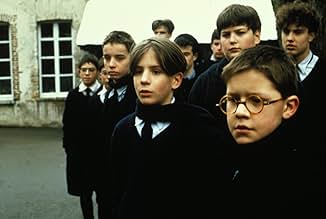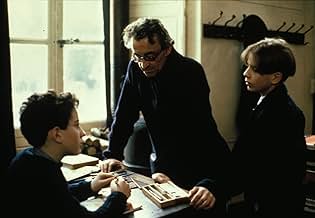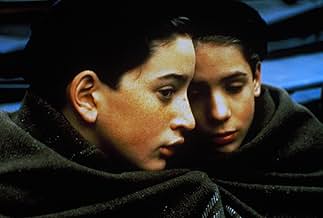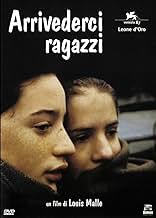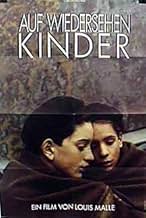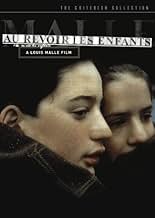Au revoir les enfants
- 1987
- Tous publics
- 1h 44min
NOTE IMDb
8,0/10
38 k
MA NOTE
Un internat français dirigé par des prêtres semble être épargné par la Seconde Guerre mondiale... jusqu'à l'arrivée d'un nouvel élève. Il devient le voisin de dortoir du premier de la classe... Tout lireUn internat français dirigé par des prêtres semble être épargné par la Seconde Guerre mondiale... jusqu'à l'arrivée d'un nouvel élève. Il devient le voisin de dortoir du premier de la classe. Rivaux au début, ils finissent par se lier d'amitié et partager un secret.Un internat français dirigé par des prêtres semble être épargné par la Seconde Guerre mondiale... jusqu'à l'arrivée d'un nouvel élève. Il devient le voisin de dortoir du premier de la classe. Rivaux au début, ils finissent par se lier d'amitié et partager un secret.
- Réalisation
- Scénario
- Casting principal
- Nommé pour 2 Oscars
- 28 victoires et 12 nominations au total
Stanislas Carré de Malberg
- François Quentin
- (as Stanislas Carré De Malberg)
Luc Etienne
- Moreau
- (as Luc Étienne)
Avis à la une
On seeing this movie several years ago my accompanying colleagues said of the film: what a load of self-indulgent, confusing, French stylized rubbish. They bemoaned the slow pace of the film, of the 2 dimensional directing and lack of any action or violent death scenes!
Those words still linger with me now and has made me realise that perhaps a lot of the movie-going public these days feed on the latest sfx pyrotechnics, more ingenious ways of abstract killings, lots of needless sex and not letting a good intelligent story get in the way.
Films like Les Enfants are going to be even more difficult to track down if Hollywood and some of the European studios opt for the fast Buck route to riches.
Les Enfant is a truly wonderful & yet harrowing account of life in a Catholic boys boarding school during the dying embers of the Nazi occupation of France in WW2. One of the new boys happens to be Jewish but the headmaster chooses to keep such identities covert while still offering him sanctuary and an education in spite of all the risks he takes.
To be fair I know little of Louis Malle previous to this film, but I think he must have poured his life's soul into writing & directing Les Enfant.
No detail, harrowing or otherwise, is spared; we see so much beauty amongst the horrors of occupation & collaboration; but also the blossoming relationship between the two lead boys and how initial envy & hatred of the Jew is somewhat diluted by the realities that this is no infantile school game but that life and death for the Jewish boy hangs by a thread if anyone at the school should reveal his true identity.
The final moments are perhaps one of the most sad & dramatic scenes I have ever seen. These days a lot of people would be waiting for some great heroic entrance from a big movie star to sort out all the misery and leave us with a reassurance that "it really wasn't all that bad back then was it".
But there are no heroes at the end of this movie, at least not the kind of heroes Hollywood serves up. The boys in this film are the true heroes right to the very end, primarily for their spirit of humanity in the face of impossible odds.
This is the hard reality of war amongst children growing up not only in the face of their own adolescence (and all the problems that serves), but also with the dark fingered claw of Nazism hanging menacingly like the the Scythe of the Grim Reaper.
This film will move you in so many directions and will hopefully bring you back down to earth from the current Hollywood shallow circus of pap & style-over-content.
Its a difficult film to track down, and the reason for this can be attributed to the first paragraph of this review.
*****/*****
Those words still linger with me now and has made me realise that perhaps a lot of the movie-going public these days feed on the latest sfx pyrotechnics, more ingenious ways of abstract killings, lots of needless sex and not letting a good intelligent story get in the way.
Films like Les Enfants are going to be even more difficult to track down if Hollywood and some of the European studios opt for the fast Buck route to riches.
Les Enfant is a truly wonderful & yet harrowing account of life in a Catholic boys boarding school during the dying embers of the Nazi occupation of France in WW2. One of the new boys happens to be Jewish but the headmaster chooses to keep such identities covert while still offering him sanctuary and an education in spite of all the risks he takes.
To be fair I know little of Louis Malle previous to this film, but I think he must have poured his life's soul into writing & directing Les Enfant.
No detail, harrowing or otherwise, is spared; we see so much beauty amongst the horrors of occupation & collaboration; but also the blossoming relationship between the two lead boys and how initial envy & hatred of the Jew is somewhat diluted by the realities that this is no infantile school game but that life and death for the Jewish boy hangs by a thread if anyone at the school should reveal his true identity.
The final moments are perhaps one of the most sad & dramatic scenes I have ever seen. These days a lot of people would be waiting for some great heroic entrance from a big movie star to sort out all the misery and leave us with a reassurance that "it really wasn't all that bad back then was it".
But there are no heroes at the end of this movie, at least not the kind of heroes Hollywood serves up. The boys in this film are the true heroes right to the very end, primarily for their spirit of humanity in the face of impossible odds.
This is the hard reality of war amongst children growing up not only in the face of their own adolescence (and all the problems that serves), but also with the dark fingered claw of Nazism hanging menacingly like the the Scythe of the Grim Reaper.
This film will move you in so many directions and will hopefully bring you back down to earth from the current Hollywood shallow circus of pap & style-over-content.
Its a difficult film to track down, and the reason for this can be attributed to the first paragraph of this review.
*****/*****
"More than 40 years have passed, but I'll remember every second of that January morning until the day I die."
Part of what makes this autobiographical film from Louis Malle so powerful is that a big portion of its coming of age material is universal. In a Catholic boarding school we see hazing and random bullying while ineffectual headmasters look the other way, bedwetting, reading after hours, playground battles, curiosity about girls, and the kind of childhood events that get remembered for life, like getting lost in the woods. In other words, it's just boys trying to get through the difficulties of growing up, and really could be any group of boys, at any time.
But of course this isn't just any period, it's occupied France during WWII, and while the school full of affluent kids seems mostly insulated from that, danger lurks. Three new boys who have been admitted and given new names are secretly Jews, a fact which gradually becomes known by Julien, one of the smarter students (Gaspard Manesse, playing the young Malle). He has a rivalry and a friendship with one of the new boys (played soulfully by Raphaël Fejtö), and the nuances of their relationship not only felt authentic, but it made it hard to know how the film would play out.
I love the dimensions of the film, including the differing Catholic responses to the Jewish issue in Vichy France - some good, some bad. There is also an axis of rich/poor, and I loved the sermon where the priest shocks the visiting parents by criticizing the behavior of the wealthy. Lastly, the use of the Chaplin film 'The Immigrant' (1917) within the film is pitch perfect, and a masterful touch.
Part of what makes this autobiographical film from Louis Malle so powerful is that a big portion of its coming of age material is universal. In a Catholic boarding school we see hazing and random bullying while ineffectual headmasters look the other way, bedwetting, reading after hours, playground battles, curiosity about girls, and the kind of childhood events that get remembered for life, like getting lost in the woods. In other words, it's just boys trying to get through the difficulties of growing up, and really could be any group of boys, at any time.
But of course this isn't just any period, it's occupied France during WWII, and while the school full of affluent kids seems mostly insulated from that, danger lurks. Three new boys who have been admitted and given new names are secretly Jews, a fact which gradually becomes known by Julien, one of the smarter students (Gaspard Manesse, playing the young Malle). He has a rivalry and a friendship with one of the new boys (played soulfully by Raphaël Fejtö), and the nuances of their relationship not only felt authentic, but it made it hard to know how the film would play out.
I love the dimensions of the film, including the differing Catholic responses to the Jewish issue in Vichy France - some good, some bad. There is also an axis of rich/poor, and I loved the sermon where the priest shocks the visiting parents by criticizing the behavior of the wealthy. Lastly, the use of the Chaplin film 'The Immigrant' (1917) within the film is pitch perfect, and a masterful touch.
Au Revoir Les Enfants (1987)
A wrenching, sensitive, all-too-true drama set in a gorgeous French wooded outpost during World War II. The main actors are boys, and they play their parts with unusual conviction, unexaggerated but with intensity. And the anti-Semitism that arises, though inevitable in Nazi territory, comes subtly and really stings. The movie isn't complete without this horror, but the horror is made complete by the really vivid recreation of this kind of private boys school--a period movie at its best.
Director Louis Malle has not only a message, but a sensitive feel for the medium--for making fluid the flow and background of the plots of his films. It's also a fairly complex mix of types, and you can somehow keep them all straight as it goes--as straight as you are meant to as the facts unfold. In the end, it confirms a familiar story of Nazi terror, but one that can't be told too often.
A wrenching, sensitive, all-too-true drama set in a gorgeous French wooded outpost during World War II. The main actors are boys, and they play their parts with unusual conviction, unexaggerated but with intensity. And the anti-Semitism that arises, though inevitable in Nazi territory, comes subtly and really stings. The movie isn't complete without this horror, but the horror is made complete by the really vivid recreation of this kind of private boys school--a period movie at its best.
Director Louis Malle has not only a message, but a sensitive feel for the medium--for making fluid the flow and background of the plots of his films. It's also a fairly complex mix of types, and you can somehow keep them all straight as it goes--as straight as you are meant to as the facts unfold. In the end, it confirms a familiar story of Nazi terror, but one that can't be told too often.
In this spellbinding film, Louis Malle is able to evoke the fear and sadness some children suffer while away from home at a boarding school, the loneliness. Yet he doesn't dwell on sentimentality but only skims it, instead peppering the scenes with the bravura and faux assertiveness of adolescents. Malle and the actors adroitly juggle circumstances and emotions. Ultimately, they capture a terrifying time in history through the eyes and uncertainty of boys who aren't as grown-up as they'd like to think.
The two main characters, Julien Quentin and Jean Bonnet, are beautifully portrayed by two very capable and talented young actors. The supporting cast is equally impressive. The film is directed with a touch of genius, and holds its own when compared to another motion picture masterpiece, To Kill a Mockingbird.
The two main characters, Julien Quentin and Jean Bonnet, are beautifully portrayed by two very capable and talented young actors. The supporting cast is equally impressive. The film is directed with a touch of genius, and holds its own when compared to another motion picture masterpiece, To Kill a Mockingbird.
This is a very moving film, most likely based on an actual event. The Carmelite priest,Lucien Bunel (1900-1945, "Pere Jacques") was founder and director of the Petit College d'Avon, near Fontainebleau. He was arrested on Jan. 15, 1994, accused of hiding 3 Jewish boys among his students, and was deported to the infamous Mauthausen concentration camp. He died in Linz, Austria on June 2, 1945. Malle's film depicts the intense trauma of Jewish children who were separated from their families and forced to take on a new identity in hiding, always afraid of being found out. They also faced the dilemma of how to maintain their Jewishness in the setting of a Catholic school. So, not just another war movie, this film depicts some of the real struggles facing hidden children, many of whom were saved by courageous Christians in Europe.
Le saviez-vous
- AnecdotesBased on an incident from Louis Malle's own youth. Julien is modeled after Malle.
- GaffesWhen hiking, Julien asks what day it is and is told that it's Thursday, January 17th, 1944. That date was actually a Monday.
- Crédits fousPour Cuotemoc, Justine et Chloé. (opening credits)
Meilleurs choix
Connectez-vous pour évaluer et suivre la liste de favoris afin de recevoir des recommandations personnalisées
- How long is Au Revoir les Enfants?Alimenté par Alexa
Détails
- Date de sortie
- Pays d’origine
- Site officiel
- Langues
- Aussi connu sous le nom de
- Le nouveau
- Lieux de tournage
- Sociétés de production
- Voir plus de crédits d'entreprise sur IMDbPro
Box-office
- Montant brut aux États-Unis et au Canada
- 4 542 825 $US
- Montant brut mondial
- 4 575 613 $US
- Durée1 heure 44 minutes
- Couleur
- Mixage
- Rapport de forme
- 1.66 : 1
Contribuer à cette page
Suggérer une modification ou ajouter du contenu manquant

Lacune principale
By what name was Au revoir les enfants (1987) officially released in India in Hindi?
Répondre
![Regarder Bande-annonce [VOST]](https://m.media-amazon.com/images/M/MV5BZDlkMTI5OTgtNmU4My00MzRjLWFkNzMtYmMyMDlhNjQ2OTFmXkEyXkFqcGdeQXRyYW5zY29kZS13b3JrZmxvdw@@._V1_QL75_UX500_CR0)
